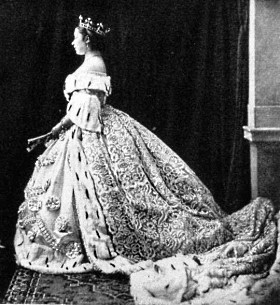Ah, Victorian era Britain (1837-1901). A place of tumultuous social, political, cultural, and technological change that is unfairly remembered today as the embodiment of Medieval traditionalism with an anti-sexual moral conservatism that borders on fascism. Victorian Britain (named after Queen Victoria) is significant for being the birthplace of the modern middle class, for the rapid and jarring transformation to a highly industrialized nation, for many social reforms (anti-slavery, prison reform, etc) the massive expansion of The British Empire, some truly fantastic fashions, and, yes, an anxious over-emphasis on morality and propriety... that only barely masked a dark and seedy underbelly of society (gambling, crime, liquor, opium and The Oldest Profession).
Victorian Britain produced some of the finest literature of the English language canon, and also some of the most famous turgid and overwrought prose in history. In Classical Music, this was the era of passionate Romantic music played by huge orchestras. It was also a time of nostalgia for a period in history that essentially never existed - the Arthurian Legend. In a similar vein, aristocrats loved historical ruins so much that some had fake ruins built on their estates.
Frequently, but by no means always, overlaps with Victorian London.
Like other eras in British history, it is named for the Sovereign.
Industrial Revolution
The Victorian Era overlaps greatly with the period historians call the Industrial Revolution, and this influenced society and culture of the day. The Industrial Revolution was a period starting the previous century, greatly advancing progress in machinery, especially related to manufacture of goods, and mining of coal - which of course, was self-perpetuating, the greater mining of coal creating further ability to improve and increase use of steam engines. Other advantages, such as easy transportation about the island, and the increasing use of trains, led to the industrial revolution completely changing the economy of Britain, and then eventually continental Europe and the United States.However, this also was responsible for the switch between the "cottage industries" and the factory economies. Instead of jobs being mostly based in at-home businesses, production began to occur more and more in factories, leading to most people moving to cities and working for very little in dangerous and long positions. On the other hand, it was the beginning of class mobility in some ways; the Victorian Era was the first time that there was a real middle class, rather than the feudal division of common and aristocracy. The corporation developed into its modern form, creating a new kind of rich person who was still "common" — the corporate executive — along with the tropes associated therewith. Industrialisation also created the beginnings of modern consumer culture. The aforementioned movement of work from at-home business to factories and (by the end of the Victorian Era) offices turned the household from a unit of production to a unit of consumption — and with the factories turning out all sorts of goodies by 1900, ordinary people were starting to buy them.
Fashion
If you know anything about the Victorian Era, you are probably thinking of those tailored dresses with corsets and men in top hats. Fashion was constantly changing, from this in the 1840sThe improvements in the textile industry allowed for fabrics to be experimented with more, and eventually industrial chemistry led to the invention of new dyes. If you think of the Victorian Era as black or white, or sepia toned, blame cameras - bright colors were usually fashionable, and often times in impressive patterns, too (like paisley!), many of which were made possible by the new technology. For instance, paisley could only be mass-produced because of the new Jacquard looms![]() , the precursor to computer-controlled manufacturing; the same was true of the fancy new tartans associated with the Romantic "revival" of supposedly-ancient Scottish traditions.
, the precursor to computer-controlled manufacturing; the same was true of the fancy new tartans associated with the Romantic "revival" of supposedly-ancient Scottish traditions.
Make-up in those days, and raised hemlines, were considered taboo and inappropriate for a woman of virtue.
The Georgian Era and The Edwardian Era are the eras before and after the Victorian Era
Famous authors from Victorian Britain include:
- Matthew Arnold
- The Sisters Bronte: Charlotte Brontë, Emily Brontë, and Anne Brontë. Most notably Emily's Wuthering Heights and Charlotte's Jane Eyre. Anne's The Tenant of Wildfell Hall was also wildly popular at the time.
- Robert Browning
- Thomas Carlyle
- Lewis Carroll, author of Alice in Wonderland
- Marie Corelli
- Charles Dickens
- Arthur Conan Doyle, author of Sherlock Holmes
- Gilbert and Sullivan
- Thomas Hardy
- Gerard Manley Hopkins
- Rudyard Kipling, author of The Jungle Book, among others.
- John Henry Newman
- John Ruskin
- Robert Louis Stevenson, author of The Strange Case of Dr. Jekyll and Mr. Hyde
- Bram Stoker, author of Dracula
- Algernon Charles Swinburne
- Alfred, Lord Tennyson
- Oscar Wilde, author of The Picture of Dorian Gray
Works of fiction set in Victorian Britain include:
- Anything about Jack the Ripper
- Assassin's Creed Syndicate
- "Barber Black Sheep" by Ann Neville.
- The Difference Engine and many Steampunk works in general.
- Emma: A Victorian Romance
- The Excavation of Hob's Barrow
- Goodbye, My Rose Garden
- How Green Was My Valley
- The League of Extraordinary Gentlemen (comic books)
- The Nevers
- Oliver Twist and most of its adaptations
- Penny Dreadful
- Sherlock Holmes stories set before 1901
- Sweeney Todd: The Demon Barber of Fleet Street (musical)
Tropes as portrayed in fiction
- Spring-Heeled Jack: As a figure ultimately derived from Victorian horror fiction, Spring-heeled Jack often features in works set in or derived from this period.
- Steampunk: As this was the time in which the steam engine became prominent, many Steam Punk works are based in Victorian Britain.
- Victorian London

